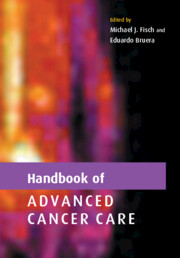Book contents
- Frontmatter
- Contents
- List of contributors
- Preface
- Acknowledgements
- PART I General concepts in oncology
- Part II Primary tumors
- 17 Lung cancer
- 18 Breast cancer
- 19 Colorectal cancer
- 20 Prostate cancer
- 21 Pancreatic and hepatobiliary cancer
- 22 Anal cancer
- 23 Esophageal and gastric cancer
- 24 Head and neck cancer
- 25 Kidney cancer
- 26 Bladder cancer
- 27 Ovarian cancer
- 28 Gynecologic malignancies: endometrial and cervical carcinoma
- 29 Testicular cancer
- 30 Unknown primary site cancer
- 31 Mesothelioma
- 32 Adult soft tissue sarcoma
- 33 Osteosarcoma and Ewing's sarcoma
- 34 Melanoma
- 35 Primary brain tumors
- 36 Thyroid and adrenal cancer
- 37 HIV-related cancer
- 38 Hodgkin's and non-Hodgkin's lymphoma
- 39 Leukemia, myelodysplastic syndrome and myeloproliferative disorder
- 40 Multiple myeloma
- Part III Management of specific symptoms and syndromes
- Index
- References
27 - Ovarian cancer
Published online by Cambridge University Press: 04 August 2010
- Frontmatter
- Contents
- List of contributors
- Preface
- Acknowledgements
- PART I General concepts in oncology
- Part II Primary tumors
- 17 Lung cancer
- 18 Breast cancer
- 19 Colorectal cancer
- 20 Prostate cancer
- 21 Pancreatic and hepatobiliary cancer
- 22 Anal cancer
- 23 Esophageal and gastric cancer
- 24 Head and neck cancer
- 25 Kidney cancer
- 26 Bladder cancer
- 27 Ovarian cancer
- 28 Gynecologic malignancies: endometrial and cervical carcinoma
- 29 Testicular cancer
- 30 Unknown primary site cancer
- 31 Mesothelioma
- 32 Adult soft tissue sarcoma
- 33 Osteosarcoma and Ewing's sarcoma
- 34 Melanoma
- 35 Primary brain tumors
- 36 Thyroid and adrenal cancer
- 37 HIV-related cancer
- 38 Hodgkin's and non-Hodgkin's lymphoma
- 39 Leukemia, myelodysplastic syndrome and myeloproliferative disorder
- 40 Multiple myeloma
- Part III Management of specific symptoms and syndromes
- Index
- References
Summary
Natural history
Ovarian cancer is the leading cause of death in women with gynecologic cancers. Often called the “Silent Killer” because there are no obvious symptoms until the disease is in its later stages, more than 23 400 new cases and 13 900 deaths were predicted from this disease in the US in 2001. One in 70 women in the US develop this disease, and 1 in 100 women die from ovarian cancer. Most women have a 1.8% lifetime risk of developing this cancer.
Ovarian cancer occurs most frequently in women aged 40–70, and the greatest number of cases is found in women between 50 and 59 years of age. Eight percent of the cases occur in women less than 35 years of age. A higher incidence is seen in Caucasian women, and this disease is more common in industrialized countries.
Approximately 20% of ovarian cancers are germ cell tumors and sex-cord stromal tumors; these cancers develop in the cells that form the eggs (germ cells) or in the cells that produce the female hormones and form the structure of the ovaries (sex-cord stromal cells). The remaining 80% are epithelial ovarian carcinomas, which begin in the cells that cover the surfaces of the ovaries. These cancers will be the subject of this chapter.
The exact etiology of ovarian cancer is unknown, although events related to incessant ovulatory function have been consistently reported in the literature.
- Type
- Chapter
- Information
- Handbook of Advanced Cancer Care , pp. 229 - 234Publisher: Cambridge University PressPrint publication year: 2003



